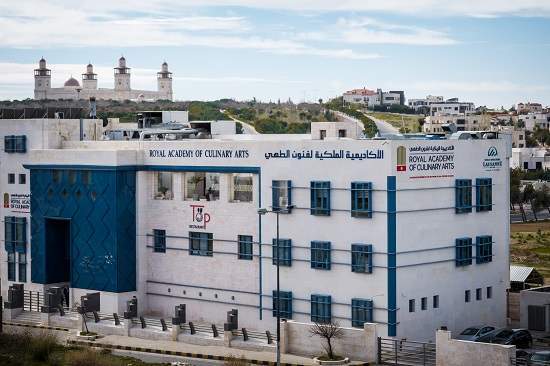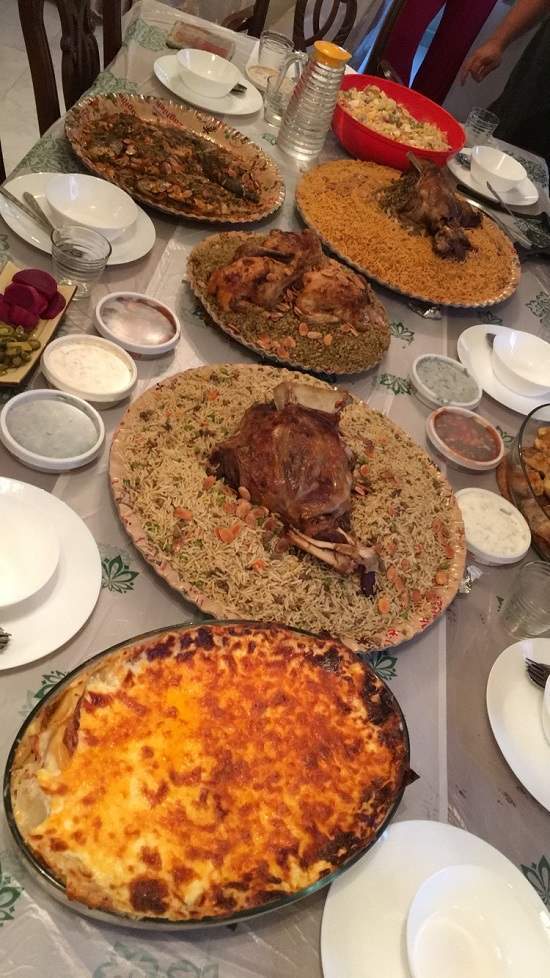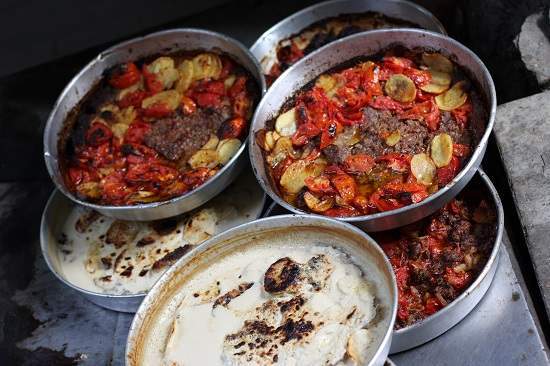AMMAN
— Jordan is renowned for its food culture and hospitality, and Jordanian
cuisine includes but isn’t limited to baking, grilling, and stuffing
vegetables, red meat, and poultry.
اضافة اعلان
Food
plays a large role in Jordanian culture and cooking, by extension, is a
fascination and hobby for many Jordanians.
As a
result, there are many institutions and organizations that offer classes. From
offering women classes with the aim of empowering them to start small
businesses to culinary schools, every cooking class in Jordan is unique.
The Royal Academy
of Culinary Arts (RACA) is a technical college that offers a variety of
English-language courses, including a two-year academic diploma in culinary
arts, a bachelor’s degree in food and beverage management, and a professional
diploma in culinary arts. The academy is accredited by the Swiss Hotel
University Lausanne.
 The Royal Academy for Culinary Arts campus in Amman. (Photo Wikimedia Commons)
The Royal Academy for Culinary Arts campus in Amman. (Photo Wikimedia Commons)
The
RACA is a
private, non-profit Jordanian educational institution established in 2008 to offer
high-quality education in culinary arts in Jordan by combining Swiss experience
and practical, professional training.
The academy is a
King Abdullah II Fund for Development project that aims to support youth
employment, empower women, support domestic tourism, and reduce the use of
external expertise in the food service and hotel industries.
Notable alumni of
the RACA include chef Ali Ghazawi, chef Abd Al-Hamed Nasir, and chef Amal Issa,
among 700 others.
Ammon
Applied University College offers food production and decoration classes in
their Kitchen Theater, which can accommodate 70 students. Furthermore, Ammon offers international
cuisine classes, and regularly hosts speakers from the tourism and hospitality
sector.
Luminus
Technical University College’s Culinary Arts Department
offers where The Culinary Arts Department is offered, and it is the first
program of its kind in the Kingdom. This program is based on refining students’
practical and technical creative skills, in addition to introducing them to the
practical and theoretical rules of the global culinary art field.
 A traditional Jordanian meal. (Photo Jude Taha Jordan News)
Petra Kitchen
A traditional Jordanian meal. (Photo Jude Taha Jordan News)
Petra Kitchen gives alternative cooking classes. It aims to have visitors to Petra learn
Jordanian cooking techniques and invites them for dinner in a friendly,
comfortable atmosphere. Local chefs teach visitors, and they share recipes and
flavors that represent typical Jordanian culture.
Petra Kitchen doesn’t
use freezers or refrigerators, and all their ingredients are purchased fresh
from local markets every day.
“We had the best time at Petra Kitchen. The chefs are
attentive and energetic, which was essential after a long day of hiking. This
is a well-run kitchen. We were able to make several simple yet delicious dishes
within an hour,” one of the visitors said.
Beit
Sitti in Jabal Luweibdeh, Amman, was founded by three sisters who wanted to
keep their grandmother’s legacy alive. They organize cooking classes and offer
traditional home-cooked meals.
 Traditional dishes served in downtown Amman. (Photo Wikimedia Commons)
Dima
Al-Hijjawi
Traditional dishes served in downtown Amman. (Photo Wikimedia Commons)
Dima
Al-Hijjawi is a local chef who creates recipes and gives cooking courses. She’s
worked as a presenter of culinary programs and is the author of several books,
including “Tasty Temptations” and “The Secret Ingredients”.
Hijjawi
is also the founder of the
Dima Al-Hijjawi Cooking Club and the owner of Flavours
Catering, through which she offers catering and event-mangement services via
Instagram.
Cooking programs are growing in popularity and
Hijawi offers tips and tricks for Jordanians to make delicious meals and sweets
through various programs and Instagram stories.
Read more Good Food

.jpg)
.jpg)
